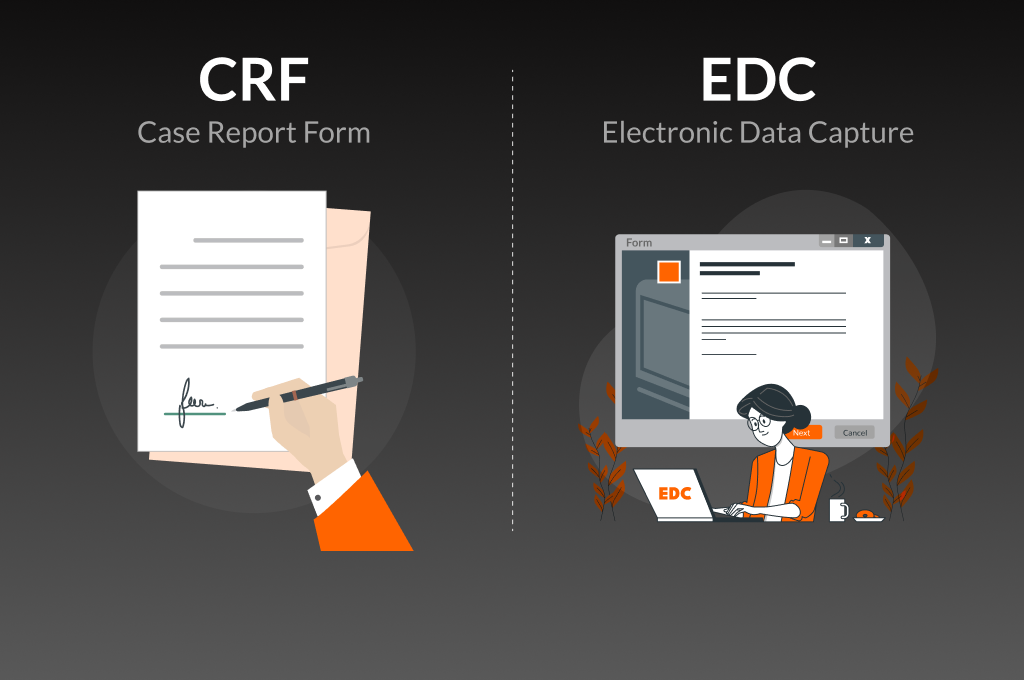Electronic Data Capture systems offer unmatched efficiencies in terms of data collection and comprehensive management of clinical trials. But that’s not all. Read on for the 5 most compelling reasons why you need an EDC system for your clinical trials.
Over the recent past, especially since the pandemic, there has been a rise in the prevalence of the use of EDC (electronic data capture) technologies in clinical trials. These approaches feature extensive data collection capabilities as well as effective management.
According to Grand View Research, Inc., the global electronic data capture systems market size was valued at USD 1.25 billion in 2022 and is estimated to expand at a compound annual growth rate (CAGR) of 14.6% from 2023 to 2030.
Imagine conducting a double-blinded clinical trial with 1000 subjects, with stratification based on gender, at least 8 visits, and conducted at sites across an entire country. The sheer volume of documentation and record keeping that the initiative would require is stupendous, with CROs buried under mountains of physical case files. Here is where an EDC system finds utility.
What is an EDC system?
When it comes to managing data, constructing a database, and carrying out analysis for clinical trials, Electronic Data Capture systems are deployed to help pharmaceutical companies and CROs achieve optimum efficiency.
An EDC system is commonly used in medical research and the pharmaceutical industry to streamline and automate the data collection process during clinical trials.
EDC systems replace traditional paper-based data collection methods, such as case report forms (CRFs), with electronic forms that can be accessed and filled out using a computer or mobile device. The system allows researchers, clinical trial coordinators, and other authorized personnel to enter, validate, and track data in a secure and efficient manner.
Why does your Clinical Trial Initiative need an EDC system
EDC systems have the potential to cut down greatly on the amount of time that would be required to complete the task using an old-fashioned or paper-based approach.
EDC systems also significantly reduce the amount of time spent on pre-study preparation inclusive of the repetitive effort and the temporal resources that would have been otherwise spent on the design and production of paper CRFs.
But wait there’s more. Here is our list of the five reasons why your next clinical trial needs an EDC system in place.
1. Enhanced Data Accuracy
- Data and consistency checks in real time
- Legible entries
- Automatic computations
- Improved data management quality performance (less data entry errors)
An Electronic Data Capture system plays a crucial role in enhancing data accuracy. By automating the data capture process, the system minimizes manual errors that can occur during data entry. It incorporates validation checks and data quality controls to ensure that captured data meets predefined standards in adherence to 21 CFR Part 11 mandates and controls.
Real-time validation during data input enables immediate error detection and correction. The integration capabilities of an EDC system help maintain data consistency across various platforms and applications. By providing standardized data capture processes, the system promotes accurate and consistent data entry. Overall, an EDC system significantly improves data accuracy by reducing errors, validating data in real-time, and enforcing standardized processes.
The reliability of the data captured is significantly enhanced by an EDC system. An EDC system makes it possible to enter legible data, and the automatic computations help produce more accurate results devoid of the possibility of human error.
2. Effective Data Management
- Data entry at the sites themselves
- Access in real time
- A unified database
- Less time spent managing queries
The digital templates offered by a modular EDC can be easily altered to accommodate each unique investigation. Earlier, data was often initially captured on paper (CRF) and human error was a major issue. ECRFs (electronic care report files) generated by an EDC circumvent this issue completely.
An EDC system plays a crucial role in effective data management. By automating the data capture process, the EDC system ensures that data is captured accurately and efficiently from various sources. It centralizes data storage, allowing for easy access, retrieval, and organization.
With its integration capabilities, the system enables seamless data flow between different applications and systems, improving data consistency and reducing data silos. The EDC system also provides tools for data validation, error tracking, and audit trails, facilitating data quality control and ensuring data integrity.
Overall, an EDC system streamlines data management processes, enhances data accessibility, and promotes data governance, leading to more efficient and effective data management within a clinical trial.
3. The Protection of Data (Data Security)
- Data protection,
- Data backup
- Permissions that are user and role-specific
Data is safeguarded and backed up by EDC providers at regular intervals. The system is run from an online server. Every user account has its own set of permissions, and the vast majority of actions can only be performed by individuals who have been given specific responsibilities thus further cementing data security levels.
An EDC system significantly contributes to increasing data security within an organization. By centralizing data capture and storage, the EDC system reduces the risk of data fragmentation and unauthorized access.
The system ensures compliance with data privacy regulations and industry standards, providing a secure environment for data management. With built-in audit trails and error tracking mechanisms, the EDC system helps detect and mitigate potential security breaches or data leaks promptly.
By implementing an EDC system, organizations can enhance data security, safeguard confidential information, and mitigate the risks associated with data breaches or unauthorized data access.
4. Regulatory Compliance
- Electronic source data verification
- Validated systems
- Data integrity
- Data integrity checks
It goes without saying that in procedures as critical as clinical trials, all legal criteria and industry standards must be met in order for an electronic data capture system to be considered compliant. Standard operating procedures, often known as SOPs, are obligatory in order to guarantee compliance with both organizational and regulatory obligations.
An EDC system is instrumental in managing regulatory compliance within an organization. The system allows for the capture and storage of data in a structured and organized manner, ensuring compliance with relevant regulatory requirements. It often incorporates validation checks, data quality controls, and standardized data capture processes to enforce compliance standards.
The EDC system can generate reports and provide data analysis capabilities that facilitate compliance monitoring and reporting. It also maintains an audit trail of data changes and captures contextual information, enabling organizations to demonstrate compliance in the event of an audit or regulatory inquiry.
5. Patient Safety
Digital solutions are a proven method of not just enhancing accuracy but also increasing patient safety. EDC systems and ePRO are the most effective ways for sponsors and investigators to collect data for clinical trials in a safe setting.
An Enterprise Data Capture (EDC) system plays a vital role in enhancing patient safety within healthcare organizations. By automating data capture processes, the EDC system minimizes manual errors and improves the accuracy of patient data. This accuracy is crucial for ensuring correct medication administration, treatment plans, and medical procedures, reducing the risk of adverse events.
The system can integrate with electronic health records (EHR) and other clinical systems, enabling seamless sharing and access to patient information, thereby improving care coordination and reducing errors related to incomplete or inconsistent data.
Additionally, the EDC system can incorporate validation checks and alerts to identify potential safety issues or medication interactions, helping healthcare providers make informed decisions and prevent harm to patients. By enhancing data accuracy, promoting information sharing, and supporting clinical decision-making, an EDC system contributes significantly to patient safety initiatives.
In Summation
In today's world, many research and biotech companies are aware of the benefits that electronic data capture (EDC) has over paper case report form (CRF) forms and therefore rely on technology to support clinical studies.
In order to keep up with the rapid pace of development in the software industry, leading tech firms in the clinical trial space are continually developing new functional advancements and features when it comes to EDC systems.
The highly acclaimed Octalsoft EDC includes a Randomization Module, an Electronic Patient-Reported Outcome (ePRO) Module, and a Trial Supply Module to facilitate the effective planning of shipments and the distribution of medications.
Octalsoft continues to maintain a commitment to decreasing the costs associated with research despite the significant reduction in the amount of time between the gathering of data and the locking of the database.
Interested in finding out more about Octalfoft’s EDC system solutions? Book a demo with us NOW.
References:
Benefits of Electronic Data Capture System In Clinical Trials (clinion.com)
What is an Electronic Data Capture (EDC) System in Clinical Trials? - Sofpromed
What is an EDC in Clinical Trials: Key Features and Benefits - Mosio



